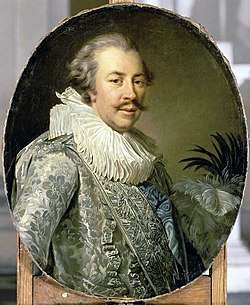Louis Hercule Timoléon de Cossé-Brissac
Louis Hercule Timoléon de Cossé-Brissac, Duke of Brissac (14 February 1734, Paris - 9 September 1792, Versailles) was a French military commander and peer of France. He was the second son and eventual heir of Jean Paul Timoléon de Cossé Brissac, 7th Duke of Brissac, who was a French general.

Life
One of the most prominent men at the courts of Louis XV and Louis XVI, he was a Grand Panetier of France, governor of Paris, capitaine colonel of the Cent-Suisses of the Garde du Roi, and a knight in various orders.
In his later years he became fond lover of Louis XV's last mistress Madame du Barry who was still very beautiful in her late forties.
In 1791, he became commander in chief of the King's Constitutional Guard. On 29 May 1792, the Assembly dissolved this corps, suspecting it of royalist and counter-revolutionary sympathies and accusing Cossé-Brissac of encouraging this and writing a speech ordering his men to go over to the king. He was sent to prison in Orléans to await judgement by the high court before being transferred to Versailles, but the prisoners were separated from their escort and freed by a group of bandits.
He was killed in the 9 September massacres, and his body was mutilated, and his head was thrust in a pike and taken on foot by a band of his killers and thrown into a window of Madame du Barry's apartment, at which sight she fainted. With little spirit but much force and courage, he held off his murderers for a long time, receiving several wounds before finally being cut down by a sabre. Always distinguished for his devotion to Louis XVI, he replied to someone praising him for his conduct: "I only do what I must do for my ancestors and my family". He is mentioned in the fifth verse of Jacques Delille's poem la Pitié, and anecdotes on him are to be found in Paris, Versailles et les provinces.
Marriage and issue
Louis-Hercule de Cossé-Brissac married in 1760 to Diane-Hortense Mancini-Mazarini (1742–1808), great-great niece of Cardinal Mazarin, and they had two children:
- Adélaïde (1765–1820), married in 1782 with Victurnien-Jean-Baptiste de Rochechouart, duc de Mortemart
- Jules Gabriel Timoléon (1771–1775), died during childhood
After the death of Louis-Hercule in 1792 without a living male-line descendant, the ducal title passed to Timoléon de Cossé-Brissac (1775-1848). He was the eldest son of Hyacinthe-Hugues de Cossé-Brissac, Duke of Cossé (1746-1813), whose father was René-Hugues de Cossé-Brissac, Count of Cossé (1702-1754). René-Hugues was the third son of Artus de Cossé-Brissac, 5th Duke of Brissac (1668-1709). After Timoléon de Cossé-Brissac died in 1848, the title of Duke of Brissac was held by his successive descendants in the male line.
Sources
- Louis Gabriel Michaud. "Louis Hercule Timoléon de Cossé-Brissac". Biographie universelle ancienne et moderne : histoire par ordre alphabétique de la vie publique et privée de tous les hommes avec la collaboration de plus de 300 savants et littérateurs français ou étrangers (in French) (2 ed.).
